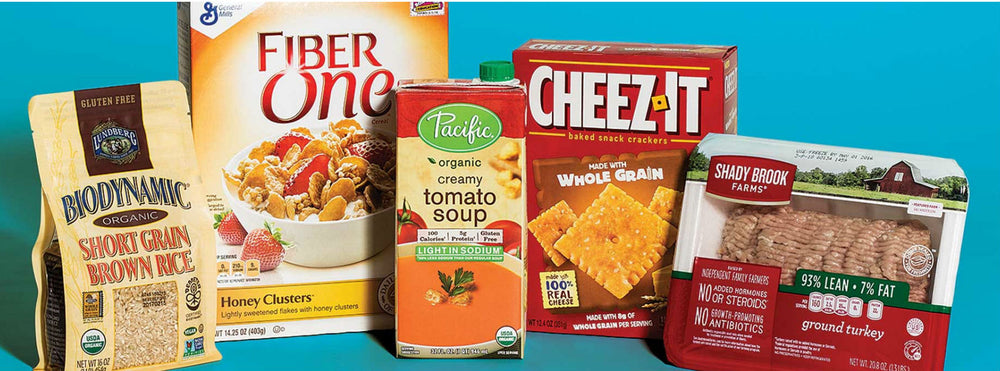Why foods that seem healthy may be making you sick... ingredient gaming

Walk into a grocery store and just try to find a packaged food that doesn’t contain some sort of health claim (Reduced sodium! Can help lower cholesterol!) or isn’t adorned by some symbol or checkmark signaling that it’s a better choice.
Difficult, right? You’ve probably even purchased products specifically because they carry those claims and checkmarks.
What if I told you that you were being duped?
It all begins with marketing which food companies rely upon to help sway a customer’s purchase decision, typically made within 3 to 5 seconds. Add multiple regulating bodies with confusing standards, plus health organizations that charge a fee for heart-healthy labels and checkmarks, and you create a landscape of deceptive food claims that are almost impossible to decipher.
This is not just a matter of misleading the public. This contributes to our health problems. After all, if these claims were even remotely true, I wouldn’t have a never-ending stream of patients walking through the doors of my cardiology practice needing help with high blood pressure, high cholesterol, and excess weight.
Over the next three weeks, I will be pointing out all the ways you are being manipulated so you can better navigate any grocery store.
Let’s start with the ingredient list. Since it is subject to strict government oversight, you’d think the ingredient list would be a perfect resource for savvy consumers. After all, FDA guidelines define everything from which ingredient names should be used in the list to the font size of the letters used to display the list on the packaging. And failure to comply with FDA rules places a food company at risk of facing serious sanctions and stiff fines.
But what you may not know is that manufacturers have found ways to use these FDA guidelines to their advantage.
According to FDA rule 21 CFR 101.4(a), ingredients must be listed “in descending order of predominance by weight”, meaning that “the ingredient that weighs the most is listed first, and the ingredient that weighs the least is listed last”.
Let’s look at the list of ingredients for PLANTERS HONEY ROASTED PEANUTS:
- PEANUTS, SUGAR, HONEY, PEANUT AND/OR COTTONSEED OIL, CORN SYRUP, SEA SALT, FRUCTOSE, CORNSTARCH, XANTHAN GUM.
The list tells you that when you’re eating these peanuts, you’re ingesting more nuts than xanthan gum.
But look again. The list contains four separate added sugars (sugar, honey, corn syrup, and fructose). These sugars may technically be distinct, but from a nutrition perspective, they are interchangeable. This is called “ingredient splitting,” and companies like Planters can use it to make it appear their product is mostly nuts, not mostly sugar. (Which is it? We can’t tell!)
On the flip side, take a look at the list of ingredients for KASHI GO PLAY HONEY ALMOND FLAX CRUNCH CEREAL:
- KASHI SEVEN WHOLE GRAINS AND SESAME BLEND (WHOLE: HARD RED WHEAT, BROWN RICE, BARLEY, TRITICALE, OATS, RYE, BUCKWHEAT, SESAME SEEDS), SOY FLAKES, BROWN RICE SYRUP, DRIED CANE SYRUP, CHICORY ROOT FIBER, ALMONDS, WHOLE FLAXSEED, WHOLE OATS, EXPELLER PRESSED CANOLA OIL, HONEY, SALT, NATURAL FLAVOR, MIXED TOCOPHEROLS FOR FRESHNESS.
The cereal appears to be made primarily from whole grains. But is it really?
FDA rules require that sub-ingredients be listed in parentheses, also in descending order of predominance by weight for the ingredient’s composition.
Manufacturers use this rule to their advantage as well. Known as “ingredient combining," it allows more desirable-sounding items to float to the top of the list as part of an ingredient bundle.
“KASHI SEVEN WHOLE GRAINS AND SESAME BLEND” sounds healthy enough. But if each of the components in the “blend” were enumerated separately, would brown rice syrup, dried cane syrup, and honey (sneaky names for sugar) float closer to the top? (Again, we don’t know.)
Ingredient splitting and combining make it almost impossible to figure out exactly what you’re eating!
Here’s a better way to use the ingredient list: Check out how long it is. The shorter, the better. Then, see how many of the ingredients you recognize. The more the list sounds like it came from a chemistry book, the less of it you should have. Foods that need lots of fortification are made from ingredients that are devoid of nutrients to begin with. Adding lots of vitamin C to Gummy Bears does not make them good for you.
At Step One Foods, we refuse to play games with food. In fact, it’s what inspired me to create a company that makes REAL foods from REAL ingredients. Every single ingredient in every Step One product was chosen for its health-promoting properties, in amounts needed to achieve clinically meaningful levels of whole food fiber, omega 3 fatty acids, antioxidants, and plant sterols.
We don’t deceptively combine or split ingredients.
Because we don’t have to.

Tested & Proven Results.
- Cardiologist formulated
- Supported by over 500 publications
- Clinically-proven, in a double-blind randomized trial with Mayo Clinic and The University of Manitoba
80% of participants lowered their cholesterol in just 30 days. With just two servings per day, Step One Foods offers a proven-effective way to naturally lower LDL (bad) cholesterol.
Get heart health tips and articles like this, delivered right to your email.
New articles every week.
You may also like...

7 Hacks for Celebrating the Holidays Without Sacrificing Health Goals

You don’t need to avoid foods with cholesterol…except for these



